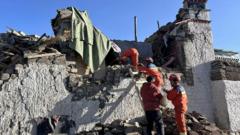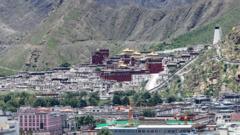With the Tibetan community facing uncertainty and increased Chinese pressure, the Dalai Lama's transition plan could be pivotal for the future of their culture and autonomy.
The Dalai Lama at 90: A Turning Point for Tibetan Exiles

The Dalai Lama at 90: A Turning Point for Tibetan Exiles
As the Dalai Lama approaches a milestone birthday, the future of Tibetan identity hangs in the balance.
As the Dalai Lama prepares to celebrate his 90th birthday on July 6, the tension surrounding the Tibetan community in exile is palpable. After nearly seven decades of guiding his followers through the challenges of Chinese oppression, the spiritual leader recognizes the urgency of his next steps. In Dharamsala, India—where he has led the Tibetan administration in exile since fleeing from Tibet—the stakes have never been higher.
While the Dalai Lama has dedicated his life to preserving Tibetan culture and advocacy for autonomy, as he ages, concerns about the sustainability of the Tibetan identity loom over the scattered community. His achievements, including the establishment of a democratic framework and social services in exile, face existential threats as well. The Chinese government's relentless efforts to repress the Tibetan identity compound the anxiety felt by the diaspora.
With a steady decline in the Dalai Lama's health and rising uncertainty regarding foreign support from global powers like the United States, Tibetans in exile are preparing for a future that could see their culture further marginalized. As part of his birthday observance, the Dalai Lama has promised to unveil a succession plan to secure the continued representation and resilience of the Tibetan people.
The upcoming celebrations will serve not only as a tribute to a revered leader but also as a crucial juncture for an entire community seeking stability in an increasingly unpredictable landscape. The Dalai Lama's approach to this transition may very well define the Tibetan struggle for years to come.
While the Dalai Lama has dedicated his life to preserving Tibetan culture and advocacy for autonomy, as he ages, concerns about the sustainability of the Tibetan identity loom over the scattered community. His achievements, including the establishment of a democratic framework and social services in exile, face existential threats as well. The Chinese government's relentless efforts to repress the Tibetan identity compound the anxiety felt by the diaspora.
With a steady decline in the Dalai Lama's health and rising uncertainty regarding foreign support from global powers like the United States, Tibetans in exile are preparing for a future that could see their culture further marginalized. As part of his birthday observance, the Dalai Lama has promised to unveil a succession plan to secure the continued representation and resilience of the Tibetan people.
The upcoming celebrations will serve not only as a tribute to a revered leader but also as a crucial juncture for an entire community seeking stability in an increasingly unpredictable landscape. The Dalai Lama's approach to this transition may very well define the Tibetan struggle for years to come.





















